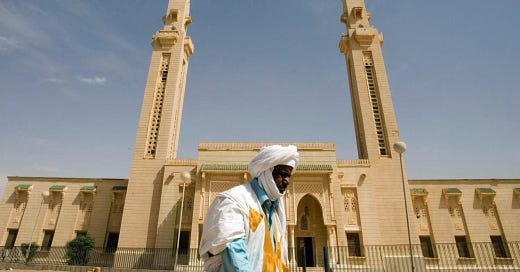Free Speech In Secret
Open discussion is taboo in Mauritania, where the slightest social critique can carry serious consequences.
Without somewhere safe to meet, Welid Ellhaje and the other members of his debate group would be in constant danger. Discussing justice, free speech and equality in Mauritania is more than controversial – it’s a violation of social norms, for which they could be ostracized, and their families too, if anyone finds out.
“Five years ago we were working on a similar project, only bigger, but the government came down very hard on us, and many had to quit due to social pressure,” Ellhaje, 24, says.
This time around, they have learned from their mistakes, working with a much smaller team to promote secular, liberal ideas in subtler ways. “In the beginning, we were frustrated, we took risks. Now we have learned to be less confrontational and try to press our message in an organized way,” adds Ellhaje, who has withheld the name of his organization for security purposes.
The team has launched an online magazine, publishing articles exploring scientific subjects, critical thinking, social justice issues and general knowledge. They also host guest speakers from overseas to lead discussions that bring new ideas to youth in Mauritania, where society is deeply rooted in tribal tradition.
“People in Mauritania have not been exposed to foreign ideas, it’s a closed society,” Ellhaje explains. Those who do challenge the status quo risk being cast out by their communities and fired from their jobs, or in some cases imprisoned and subject to physical harm. “Politics is part of the tribal system. You are not allowed to criticize anything. You blend in or you’re kicked out,” Ellhaje says.
He knows the risk members face every time they meet in a public café, so with help from an Ideas Beyond Borders Innovation Hub grant, he has secured a space to meet in private and engage in open discussion without fear of being overheard.
“Because people in Mauritania are not exposed to new ideas and our education system is poor, our youth lag behind… by introducing these ideas I want to put Mauritania on the map and expose them to a new set of ideas that can ignite some sort of change,” he says.
It’s the start of a long journey. Only recently friends of his who made a TV show that criticized social norms were punished. “They were fired, but not only them, members of their families lost their jobs too,” he says, adding: “I’m not optimistic that change will happen any time soon.”
But by planting the seeds of free thought among a younger generation that's open to different ways of thinking, he hopes to create space for new ideas and opportunities that remain beyond reach in Mauritania today.




